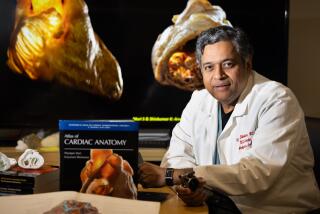Theodore Kurze, 79; Introduced Use of Microscope to Brain Surgery
- Share via
Dr. Theodore Kurze, a pioneering neurosurgeon who radically altered the practice of neurosurgery with his introduction of the microscope to brain surgery, has died. He was 79.
Kurze died May 10 at his home in Newport Beach. He had been battling prostate cancer.
Kurze’s introduction of the microscope in the 1950s was an innovation that caused death rates and complications from surgery to plummet.
“To do brain surgery before the microscope ... you had to be able to accept the fact that people didn’t do well, that you were hurting and maiming people by trying to help them,” said longtime colleague Dr. Peter J. Jannetta, professor of neurosurgery at Allegheny General Hospital in Pittsburgh. Surgeons in those days could ill afford to become too friendly with their patients, said Jannetta.
Then, in 1957, Kurze--who was in private practice in Los Angeles--and his colleague Dr. Robert Rand of UCLA introduced the microscope to better visualize the neural tissues they were working with. Such methods had already helped change ophthalmology as well as ear, nose and throat surgery.
“Ted had the sense to walk the microscope across the hall from the laboratory to the operating room--it was a simple, fabulous, constructive idea,” said Jannetta, who as a UCLA resident in the 1960s would assist Kurze and Rand at operations around Los Angeles so he could learn their techniques.
Kurze first used the operating microscope in his surgical specialty: removal of tumors on the nerves supplying the ear and balance organs. Operations on these growths, called acoustic neuromas, used to kill 20% to 30% of the patients and cause serious side effects such as hearing loss, facial paralysis and difficulty swallowing in the majority of survivors.
Today, mortality for such surgery is less than 1% and rates of serious complications are below 10%, said friend and colleague Dr. Martin Weiss, chairman of the department of neurological surgery at USC’s Keck School of Medicine, a department once headed by Kurze.
In the years that followed, the use of the microscope became ubiquitous in neurosurgery.
“It made surgery infinitely safer and really revolutionized what we were able to do,” Weiss said.
Kurze was born in Brooklyn, N.Y., on May 18, 1922, and grew up in Floral Heights, Long Island. He graduated from Washington College in Chestertown, Md., in 1943, and received a doctor of medicine degree from Long Island Medical College (now SUNY Downstate Medical School) in 1947.
Kurze held several academic positions, and was associated with USC in various capacities from 1959 to 1987. From 1963 to 1978 he served as chairman of the department of neurological surgery, and concurrently as director of neurological surgery at the Los Angeles County Medical Center.
He was a member of many distinguished neurosurgical societies and from 1968 to 1974 served on the American Board of Neurological Surgery, the body responsible for the certification of neurosurgeons.
Kurze, said Weiss, was a “chatty, gregarious, outspoken bon vivant” with a love of sailing and cooking.
In a 1981 Times interview, Kurze described unwinding from 10- to 12-hour stints of surgery by whipping up favorites like avocado soup and huevos rancheros. He approached cooking much like surgery, carefully setting out his utensils and ingredients in advance, just as he would do with his surgical instruments.
Kurze also had a long-standing interest in medical ethics, taught courses on the subject and received an honorary degree in that field from Washington College.
He consulted for television programs such as the medical drama “Ben Casey.” In fact, recalled Weiss, “He always claimed that the role of Ben Casey was modeled after him--and like Ben Casey, he was a bit of an independent spirit who spoke his mind.” Kurze is survived by his wife, Joan Kurze; four grown children from a previous marriage, Janet Kurze of Rock Creek, Ore., Peter Kurze of San Luis Obispo, Carol Nicholson of Baltimore, and Heather Kurze of South Pasadena; and eight grandchildren.
The family requests that donations in his memory be sent to the Theodore Kurze ’43 Memorial Fund, c/o Washington College, 300 Washington Ave., Chestertown, MD 21620, or c/o Alumni Fund for Theodore Kurze, Alumni Assn., College of Medicine, SUNY Downstate Medical Center, 450 Clarkson Ave., Box 1204, Brooklyn, NY 11203.




